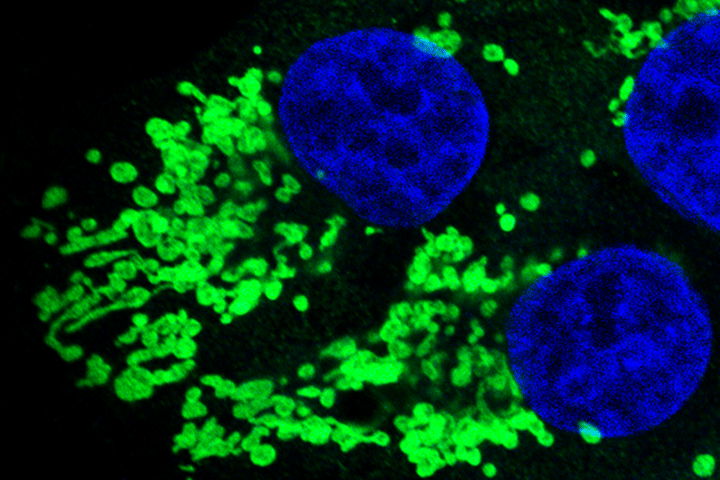Genetic Testing for All Pancreatic Cancer Patients

Courtesy of the Mayo Clinic
If you’ve ever wondered how researchers identify genes that may be linked to disease, know this.
“It’s not like throwing spaghetti against the wall to see if some of it sticks,” laughs Gloria Petersen, Ph.D., Professor of Epidemiology at Mayo Clinic, Rochester, Minnesota. Rather, it’s an insightful, complex process, and a symbiotic relationship between ever-increasing technological advances and the basic sciences.
Genetic research identifying six genes that can lead to pancreatic cancer, recently published in the Journal of the American Medical Association (JAMA), may bring insight and benefits not only for patients, but also their families. This research, along with other work, supported changes by two prestigious cancer organizations to recommend consideration of genetic testing for all pancreatic cancer patients and, if a mutation is discovered, testing of their family members, too. “What our work tells us is that we can now inform many more people instead of limiting our advice only to those patients with a family history,” says Petersen, who, along with Fergus J. Couch, Ph.D., is a senior author of the study.
About the Study
The researchers analyzed 21 cancer predisposition genes in 3,030 pancreatic cancer patients who were seen at Mayo Clinic between 2000 and 2016. This large sample size was the direct result of a continuous research recruitment program set up by Petersen. “I’ve been at Mayo Clinic for over 18 years studying the epidemiology of pancreatic cancer; this has required large patient samples, so I set up a system in which we routinely approached all patients (with pancreatic cancer) who visited Mayo Clinic and asked if we could study their family history and a blood sample for cancer research,” Petersen explains. In addition, the study compared the Mayo Clinic patient genetics to those of “reference controls,” who were 123,136 individuals with exome sequence data in the public Genome Aggregation Database, and 53,105 in the Exome Aggregation Consortium database. These databases were developed by a consortium of international investigators whose goal is to make summary data available to scientists throughout the world.
The study found six genes clearly linked to an increased risk of pancreatic cancer. According to results, 5.5 percent of patients had an alteration in at least one of these six genes. And among those with a family history of pancreatic cancer, 7.9 percent had a germline mutation. The research also showed that 5.2 percent of patients who did not have a family history of the disease also carried at least one of these mutations.
“It was a wonderful confluence of our strategy to recruit patients into research and novel technology developed by Fergus (Couch) to test a large amount of genes all at once in a small amount of DNA,” Petersen explains. “There was a great sense of collaboration and, most important, it’s something that is going to be especially helpful to patients and their families.”
The Genes and Potential Risk
In this study, mutations were found in six genes: ATM, BRCA1, BRCA2, CDKN2A, MLH1, and TP53. Some genes carried a higher risk than others. The highest risk of pancreatic cancer was found in mutations in CDKN2A, but the frequency of finding this mutation was low. A mutation in ATM, a gene that is involved in regulating DNA damage, was also significantly associated with pancreatic cancer.
Mutations in TP53 were also significantly associated with pancreatic cancer, but researchers did not know if the patients carrying these mutations had Li-Fraumeni syndrome or a family history of the syndrome. Li-Fraumeni syndrome is a very rare condition that predisposes people to the development of certain cancers.
Although mutations in PALB2 are being studied for increased pancreatic cancer risk, this research did not find a significant association. CHEK2 mutations were also not significantly associated with pancreatic cancer.
BRCA1 and BRCA2 mutations, two of the most well-known and studied of the group, also increase the risk for pancreatic cancer, as well as being known risk factors for breast and ovarian cancers. But the presence of these mutations in a pancreatic tumor has also been shown to predict response to specific treatments, such as platinum-based therapy or PARP inhibitors. This more personalized approach to pancreatic cancer care is a direct result of molecular profiling of tumors, but now germline susceptibility will also offer clues, Petersen explains.
Genetic Testing for All Patients
Based on these pivotal findings, as well as other research, the National Comprehensive Cancer Network (NCCN) and the American Society of Clinical Oncology (ASCO) have updated their recommendations for pancreatic cancer. In general, the new recommendations state that genetic testing for all patients with pancreatic cancer should be considered, regardless of personal or family history of cancer. Secondly, if that testing reveals a germline mutation, family members should also consider being tested.
“In our field it was huge that two prestigious organizations came to the very same conclusion about (genetic) testing for pancreatic cancer, and I think one of the supporting reasons is that we showed these mutations are a lot more common than was realized,” Petersen says. “All of the recommendations these organizations make are based on very sound science, and ultimately those at risk for this disease can benefit from screening, and those with the disease may benefit from more tailored treatment based on the profile of their tumors.”
A Hope-Filled Future
Further research will be necessary to replicate these findings in other populations. Petersen is hopeful about the future. “Twenty years ago there weren’t advocacy organizations or a lot of money being given to pancreatic cancer research, but today it’s very different, and it has paid off in terms of our basic understanding of the disease, treatment, and longer-term survival for some patients,” Petersen says. “But we obviously need earlier detection because that, right now, is the only chance for a cure. And one way to do that is to learn as much as possible about the genetics of this disease. Getting all pancreatic patients tested is a huge step in making that happen.”






